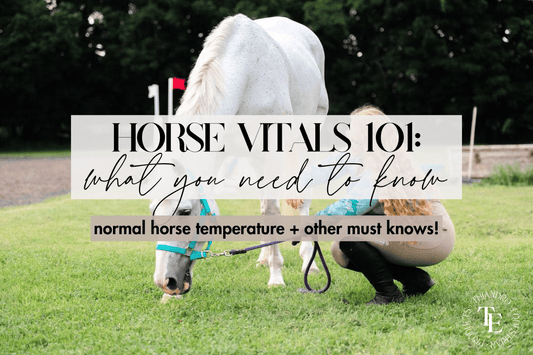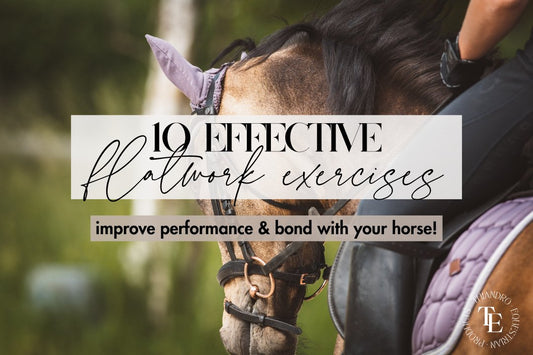Thinking about buying a horse and wondering how much does a horse cost? Get to the bottom of the true expenses of horse ownership with our complete guide.
Horses are magnificent creatures that capture the hearts of many, but before diving into horse ownership, it's crucial to understand the financial commitment involved. From the initial purchase price to ongoing care expenses, owning a horse requires careful planning and budgeting. In this comprehensive guide, we'll explore the various factors that contribute to the cost of owning a horse, providing valuable insights for both prospective and current horse owners.
Don’t forget to download our FREE 2024 Equestrian Planner & budget tracker to keep all aspects of your horsey life in check and organized!
How Much Does It Cost to Buy a Horse?
Factors Affecting Horse Prices
When considering the cost of purchasing a horse, several factors come into play, influencing the price tag associated with each equine companion:
Age, Breed, Gender, and Training Level
The age of the horse, its breed, gender, and level of training significantly impact its market value. Younger horses may be less expensive but require additional training, while older, well-trained horses may command a higher price. Additionally, old horses or those with athletic/health issues may be sold for a cheaper price.
Pedigree and Bloodlines
Horses with prestigious pedigrees and desirable bloodlines often come with a premium price due to their potential for performance, breeding, or show success.
Conformation and Physical Attributes
The horse's conformation, including its build, size, and physical appearance, can influence its market value. Horses with excellent conformation and desirable traits may command higher prices.
Average Cost of a Horse
The cost of purchasing a horse can vary widely, ranging from free to tens, even hundreds of thousands, depending on various factors.
Different horse breeds and disciplines may have distinct price ranges. Certain breeds bred for specific purposes, such as racing or competitive sports, may be more expensive than others.
For example, in the United States the hunter world is notorious for high prices. Even a budget of $50,000 is considered low by many trainers and riders alike. That being said, don’t be put off by this. There are plenty of opportunities for quality horses well under this price, you may just have to be a bit flexible with your requirements or extend the geographic parameters of your search.
Considerations for Budget-Friendly Options and Rescue/Adoption
Prospective horse owners may want to explore budget-friendly options, such as adopting horses from rescue organizations or considering horses in need of rehoming. Rescue horses can make excellent companions and may come with lower adoption fees compared to purchasing from breeders or private sellers.
Another option for lower priced horses is to purchase an off-the-track thoroughbred, which are typically more affordable than other horses due to needing to be retrained for a new discipline.
No matter what your budget is when you’re horse shopping though, it’s always important to work with a qualified trainer that you can trust. You don’t want to get into a situation where you purchase a horse that is beyond your ability level, because that can get dangerous very fast!
You should also have a trustworthy vet who can perform a pre-purchase examination before you commit to purchasing anything. Some horses, even if offered for a low price, will end up costing you more than if you had bought something more expensive due to health or soundness issues that you may be able to diagnose through a thorough pre-purchase exam.
How Much Does a Horse Cost Per Month?
Boarding or Stable Fees
The cost of boarding or stabling a horse is a significant ongoing expense that varies depending on factors such as location, facilities, and the services provided. Boarding fees can range widely depending on the region, the amenities offered by the facility, and the level of care provided. Factors such as stall size, turnout options, and additional services like grooming or training can also affect the cost.
Boarding fees can range anywhere from a few hundred dollars a month for a self-care location (i.e. the boarder takes care of their horse on their own and is only paying to rent a stall or a spot in a pasture) to several thousand and up for full service facilities with training.
Horse owners typically have several boarding options to choose from, including self-care, full board, or pasture board. Each option comes with its own set of costs and considerations, such as the level of care provided and the amount of time the horse spends outdoors.
Feed and Nutrition
Proper nutrition is essential for maintaining a horse's health and well-being, and the cost of feed and nutritional supplements can vary depending on several factors.
Horses require a balanced diet consisting of hay, grain, and possibly supplements to meet their nutritional needs. The type and quality of feed can impact costs, with specialized feeds or supplements often commanding higher prices.
The monthly cost of feeding a horse can vary depending on its size, activity level, and dietary requirements. On average, horse owners can expect to spend at least several hundred dollars per month on feed and nutritional supplements.
Veterinary Care
Routine veterinary care is essential for keeping horses healthy and addressing any medical issues that may arise. The cost of veterinary care includes routine veterinary visits for vaccinations, dental care, and health check-ups are necessary to ensure the horse's well-being. These visits typically incur standard fees for the services provided.
In addition to routine care, horse owners should budget for emergency medical expenses, such as injuries, illnesses, or colic episodes. Emergency veterinary care can be costly (anywhere from several hundred to several thousand and up, depending on what is needed), so it's essential to consider insurance options to help cover unexpected medical bills.
Farrier and Hoof Care
Regular hoof care is vital for maintaining a horse's soundness and mobility, and the cost of farrier services can vary depending on several factors.
Horses require regular hoof trimming and shoeing to prevent issues such as overgrowth, imbalance, or lameness. The cost of farrier services typically includes the trimming or shoeing of all four hooves. In some cases, horses may require corrective shoeing or specialized hoof care to address issues such as laminitis, navicular syndrome, or hoof imbalances. These additional services can incur extra expenses beyond routine hoof care.
Equipment and Tack
Investing in the necessary equipment and tack is essential for horse ownership, and the cost of purchasing and maintaining riding gear can add up over time.
Horse owners should budget for the initial purchase of riding equipment, including saddles, bridles, halters, and grooming supplies. The cost of high-quality tack and equipment can vary depending on the brand, material, and intended use.
The astronomical cost of riding gear was one of the main reasons we founded Thiandro Equestrian, so be sure to check out our wide selection of affordable riding leggings and riding shirts when looking for new riding apparel that won’t break the bank!
Riding equipment and tack may also need to be replaced or repaired due to normal wear and tear. Regular maintenance, cleaning, and storage practices can help prolong the lifespan of tack and minimize replacement costs.
Additional Considerations for How Much Do Horses Cost
Training and Lessons
Investing in professional training and riding lessons is essential for both horse and rider development, but it comes with its own set of costs:
Enrolling your horse in professional training programs can help address behavioral issues, improve performance, and enhance overall training progress. The cost of training programs varies depending on the trainer's experience, reputation, and location.
Taking riding lessons is beneficial for riders of all skill levels, from beginners to advanced competitors. Lesson costs vary based on factors such as the instructor's qualifications, lesson duration, and facilities offered.
Transportation
Transporting horses to and from various locations is a necessary part of horse ownership, and it involves several associated expenses. Investing in a horse trailer allows for convenient transportation to shows, trail rides, or veterinary appointments. The cost of purchasing a trailer can range from several thousand to tens of thousands of dollars, depending on the size, features, and condition of the trailer. Alternatively, renting a trailer for occasional use may be a more budget-friendly option.
In addition to the initial purchase or rental cost, horse owners should budget for ongoing expenses such as fuel, maintenance, and insurance for their trailer. Regular maintenance, including tire checks, brake inspections, and trailer hitch lubrication, is essential for safe and reliable transportation.
Facility Maintenance
Maintaining a horse property requires ongoing attention and resources to ensure the safety and comfort of both horses and humans:
Fencing and Pasture Management
Proper fencing is crucial for containing horses safely and preventing escapes or injuries. The cost of fencing materials and installation varies depending on factors such as fence type, length, and terrain. Additionally, ongoing pasture management practices, such as seeding, mowing, and weed control, contribute to the overall maintenance of the property.
Barn Upkeep and Equipment Maintenance
Regular maintenance of barn structures, including roofs, stalls, and flooring, is necessary to provide a safe and comfortable environment for horses. Equipment used on the property, such as tractors, mowers, and water troughs, also require routine maintenance and repairs to ensure optimal functionality and longevity.
Budgeting Tips for Horse Ownership
Creating a Monthly Budget
To effectively manage the costs associated with horse ownership, consider implementing the following budgeting strategies:
- Tracking Expenses and Prioritizing Spending:
- Keep detailed records of your horse-related expenses (check out our FREE equestrian planner & budget tracker here!), including feed, vet visits, and equipment purchases. By tracking your spending, you can identify areas where you may be overspending or where cost-saving opportunities exist. Prioritize essential expenses such as feed, veterinary care, and farrier services, while allocating discretionary funds for non-essential items.
- Setting Aside Funds for Unexpected Expenses and Emergencies:
- It's essential to budget for unexpected expenses, such as veterinary emergencies or equipment repairs. Consider setting up a dedicated emergency fund specifically for horse-related expenses to cover unforeseen costs without jeopardizing your financial stability.
Exploring Cost-Saving Options
Look for opportunities to reduce your horse-related expenses without compromising the quality of care:
- DIY Horse Care and Maintenance Tasks:
- Whenever possible, consider tackling basic horse care and maintenance tasks yourself. This may include grooming, basic first aid, and routine maintenance chores around the barn. By handling these tasks independently, you can save money on professional services and develop a deeper understanding of your horse's needs.
- Joining Co-op Boarding Facilities or Sharing Expenses with Other Horse Owners:
- Co-op boarding facilities or shared ownership arrangements can provide cost-saving benefits for horse owners. By splitting expenses such as boarding fees, feed, and facility maintenance with other owners, you can reduce the financial burden of horse ownership while still providing quality care for your equine companion.
Investing in Quality Care
While it's tempting to cut costs wherever possible, prioritizing your horse's welfare and health should always remain your top priority:
- Prioritizing Horse Welfare and Health Over Cost-Cutting Measures:
- Avoid compromising on essential aspects of horse care, such as nutrition, veterinary care, and proper housing, to save money. Investing in high-quality feed, regular veterinary check-ups, and suitable shelter is crucial for maintaining your horse's health and well-being in the long run.
- Seeking Guidance from Experienced Horse Owners and Professionals:
- Don't hesitate to seek advice and guidance from experienced horse owners, trainers, and equine professionals. They can offer valuable insights, tips, and recommendations for managing the costs of horse ownership while ensuring the best possible care for your horse.
By implementing these budgeting tips and strategies, you can navigate the financial aspects of horse ownership more effectively while providing the best possible care for your equine companion. Remember that responsible budgeting and thoughtful decision-making are key to enjoying a fulfilling and rewarding experience as a horse owner.




